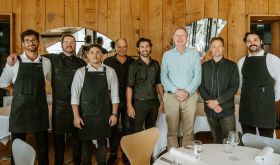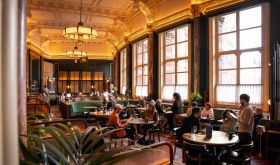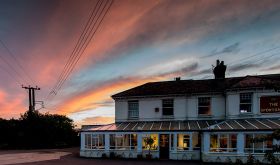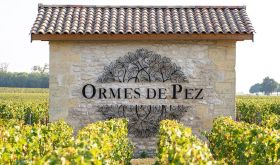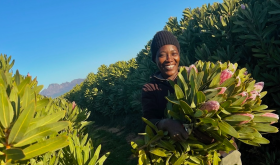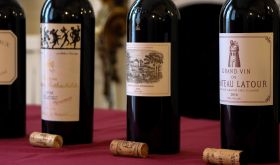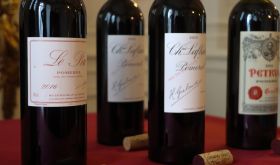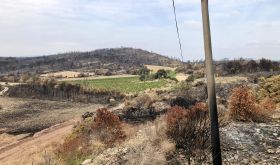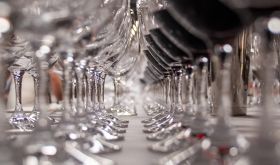I readily accepted the invitation to be a speaker at GRIF, the recent Global Restaurant Invitation Forum, in Dubai. It had been more than a decade since I had last visited this city and during this period Dubai, thanks to its rapidly increasing tourist numbers and location as a halfway house for those travelling around the world, has been an attractive second home for chefs and those keen to franchise their restaurants.
As a result there was a fascinating collection of individuals at the conference: Jean-Luc Naret, the former head of Michelin, who is now based here as a consultant; Todd English, the peripatetic chef from the east coast of the US; Mikhail Zelman from Russia who has now franchised his highly successful Burger & Lobster as far afield as Dubai; Bob Puccini from San Francisco who has designed over 1,000 restaurants and whose latest project, much to his surprise, is in Nepal; and Troy Hickox who, as Vice President of Hospitality Development for the Galaxy Entertainment Group in Macau, is probably in a position to open more cafes and restaurants in the coming five years than anyone else in the world.
Yet all this accumulated expertise was not able to find a solution to the particular challenge facing Dubai’s restaurateurs. Because the vital alcohol licences may be held only by someone operating within an hotel complex or, in a more recent amendment, to anyone operating within the charmless confines of the DIFC, Dubai International Finance Centre, ultimate control over the restaurant lies with either hoteliers or property developers, neither of whom tend to have the social antennae required to be successful, hospitable restaurateurs.
Hence the presence in so many hotels of siblings to successful restaurants elsewhere, such as Zuma and Coya most recently; joint ventures with chefs who fly in and out; and Greg Malouf’s Clé in the DIFC which feels cold thanks to its entrance right by an escalator despite the authenticity of his modern Middle Eastern cooking.
It is this situation that led to a considerable amount of soul searching as to whether a better way forward could be found by allowing restaurants in hotels to be more independent in their management and risk taking. My own experience over the two chances I had to dine out is that there could be considerable merit in this alternative approach.
My interest was certainly piqued by the news of the opening two months ago of the Nusr-Et restaurant in the Four Seasons hotel. Given the current fascination for steak houses, this seemed a clever but not too risky association with a small group of restaurants that began in Istanbul via its founder Nusret Göçke, initially a butcher by trade.
And certainly the meat here is excellent, as are all the trivial details that come out of an expensive design studio such as small meat cleavers as door handles on the lavatories. But there were certain aspects of the meal that would have any self-respecting restaurateur hanging his head in shame. The menus were grubby and stained with meat juices. Two managers obviously seemed to be having more fun taking selfies with a waiter than looking after their customers. And the glass-fronted fridge that stores the uncooked meat would not have looked out of place in a kebab shop.
A much happier experience was to be had the following evening at Qbara in the shadow of the Raffles Hotel in Wafi City, a ten-minute drive from the city centre.
In fact I would go so far as to say that this meal was the most exciting expression of modern Arabic cooking I have ever experienced. And the sheer pleasure was highlighted by the fact that this building once housed a Planet Hollywood and is the creation of the most unlikely group of individuals.
At the helm are Austrian restaurateur Elmar Pichorner and his British chef/partner Patrick John. In charge of the kitchen that comprises cooks from Syria, Egypt, Turkey and the Levant is Colin Clague who will proudly return to his native Isle of Man in September to headline its annual Food Festival. The impressive wine list is collated by the softly spoken Juan Van Huyssteen from South Africa and the music, an essential ingredient in Dubai restaurants, is provided by Nicholas Séchaud, born in Germany but who grew up in Canada. The new interior, incorporating Moroccan carpets, Afghan stone carvings and a chandelier in the form of a floating dome, is the creation of Studio Glitt in Tokyo.
Clague writes a menu that in his expression explores the modern Arab vernacular drawing on his experience of having successfully taken the same approach with Japanese food while at Zuma . He also, quite shamelessly, asks his cooks to prepare the dishes they enjoy at home and then adapts them.
The very impressive results ranged from briouates of prawn, pounded thinly then encased in crisp filo pastry and served with their own harissa; grilled octopus with spicy green chilli and coriander zhug; roast bone marrow with Arabic bread; and a salad of watermelon that had been pressed to remove all the moisture served alongside heirloom tomatoes, a combination that was as colourful as it was refreshing. Our main course, sayadieh, black cod with spiced rice served in the metal dish in which it had been cooked so that the rice had caramelized underneath, is addictive.
This is an addiction that could more readily be enjoyed from 2016 should Qbara’s backers finalise their proposed deal for a site in London’s West End.
Nusr-Et, Four Seasons, Jumeirah Beach Road, Jumeirah 2, Dubai, UAE; tel +971 (4) 270 7777
Qbara, WAFI City, Dubai, UAE; tel +971 (4) 709 2500



